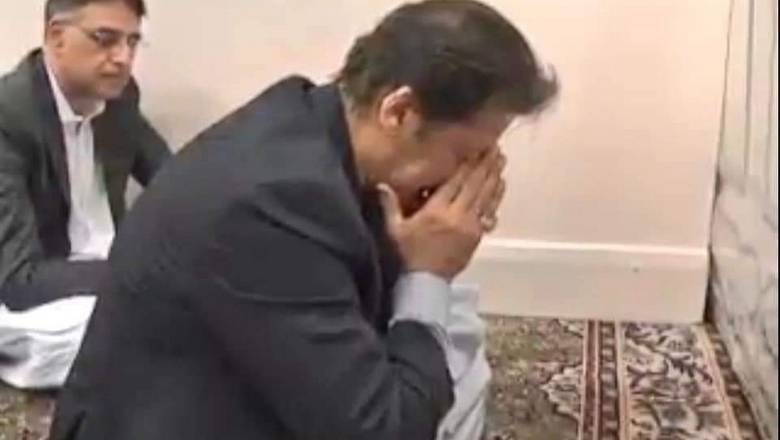Steps needed for converting Pakistan into Madinah-like state

Stay tuned with 24 News HD Android App

Whenever Prime Minister Imran Khan reiterates his resolve to transform Pakistan into a Madinah-like state, it ostensibly means that he intends to make the 73-year-old country crime-free, corruption-free, prosperous and an ideal piece of land where the system of justice is exemplary and people lead happy lives.
At a meeting with a delegation of the Council of Islamic Ideology (CII) in Islamabad on Monday, he said the desired state would be established in three phases, for which he sought recommendations from the CII.
If we take the steps taken by the PTI government during the past 34 months for the achievement of this target it can be said with certainty that the destination remains as distant as ever – because those in power are yet to take any major step in this direction.
It will probably take a government ages – yes ages – countless uninterrupted terms if baby steps in this direction are started today.
The reason is that the situation in all walks of life is so bad – depressing – that it will not be easy for anyone to accomplish the mission.
If it took seven decades to hit the bottom it will take as much time to come out of it. Neutralizing the resistance offered by the so-called liberals and other sectors will not be an easy task.
Let’s see what will have to be done to make Pakistan a crime-free society.
This will not be possible as long as the police and the present system are there.
It can be alleged without a fear of contradiction that police people are responsible for crime and deep-rooted corruption in society.
It’s a common knowledge that 99.9 percent people (the remaining 0.1 percent may be an exception) join this department because it offers unlimited opportunities for indulgence in corruption and lawlessness. And those in police uniform have immunity from any action, no matter how serious crime they commit.
Three-time former Punjab chief minister Mian Shehbaz Sharif, known for his administrative capabilities, had repeatedly expressed his resolve to change the police culture. Despite all efforts and powers that he enjoyed he miserably failed. He could not bring about slightest change in the police culture.
No government could bring about any change in the police culture, hollow claims to the contrary, notwithstanding.
Frankly speaking, a station house officer is more powerful in his territorial jurisdiction than the chief minister in the province. Give the SHO any target – lawful or unlawful – and he will deliver.
The authority of an SHO was well illustrated by a statement made recently by federal minister Faisal Vawda.
While trivializing the defiance shown by a group of angry PTI legislators and their reckless utterances against the prime minister and the Punjab chief minister a few days ago he had said only an SHO is more than enough to “straighten” them all.
An SHO can implicate any one in any baseless case and thus bring about an immediate, qualitative change in any situation, no matter what happens subsequently.
Corruption has become way of life for the police people of all levels. They amass money through corrupt practices. Halal income is something alien to them.
Probe into the assets of SHOs, DSPs, SPs and higher officials would establish how disproportionate they are to their salaries and other known sources of income.
Unless the mindset of police people is changed – which is almost impossible- the situation will not improve – and the prime minister’s resolve will remain a dream.
Bringing about a change in the patwari culture is another uphill task.
Land frauds are committed with the connivance of patwaris.
He is the one who can show on record anybody as the owner of any piece of land.
This office is as – or even more – corrupt than the police.
Investigation of the assets of patwaris or other officials of the revenue department will astonish everyone.
A number of departments are on the decline or are dysfunctional because of rampant corruption in them. Resources allocated by various governments to revive them go into private pockets as a result of which the individuals are richer than institutions. As a result, a number of departments have become a liability on the public exchequer.
The situation in the Pakistan Steel, PIA, Railways and WAPDA will better explain the point.
The elected representatives are also corrupt to varying degrees.
Many people want to get elected as public representatives to be able to have a say in state matters.
They violate merit to get their favourites appointed on coveted, “high-yield” positions.
The importance of an elected representative in the Islamic republic is proportionate to his ability to flout laws and rules of game and go scot-free.
Islamic punishments and an interest-free economy are yet to be introduced.
Most of the teachers, ulema, doctors, lawyers, judges, journalists, businessmen are not performing their duties honestly. Getting salaries and other benefits without performing duties has become a culture.
In other words, the system of checks and balances is not working. Take any walk of life and it is not what it should be.
This is a synopsis of the prevailing situation.
All this means that while it is encouraging that the prime minister wants to make Pakistan a Madinah-like state, it’s not an easy task.
The mission will take ages to accomplish. And probably the PTI government is yet to take the first step in that direction.
Therefore, achievement of the goal even in the distant future will not be possible and are no more than daydreaming.
